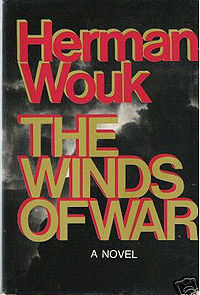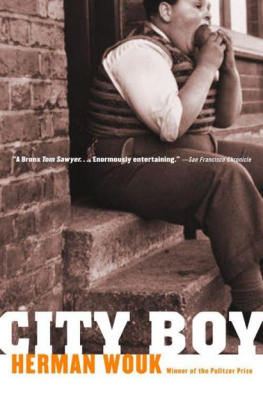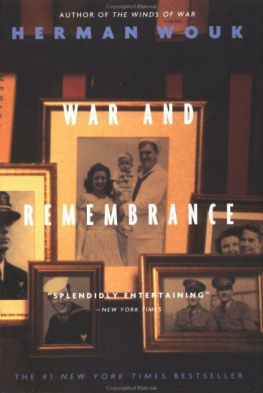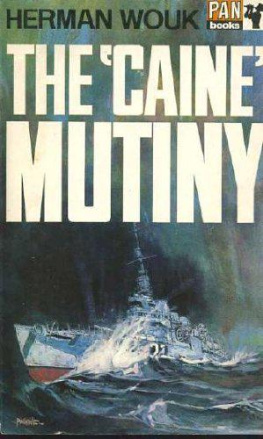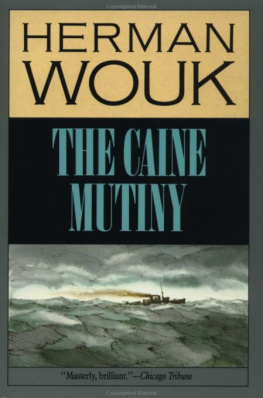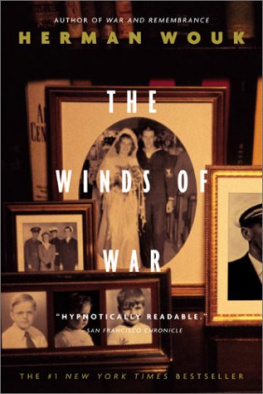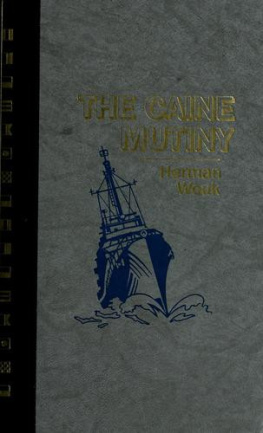HERMAN
WOUK
____________
THE WINDS
OF WAR
Foreword
The Winds of War is fiction, and all the characters and adventures involving the Henry family are imaginary. But the history of the war in this romance is offered as accurate; the statistics, as reliable; the words and acts of the great personages, as either historical, or derived from accounts of their words and deeds in similar situations. No work of this scope can be free of error, but readers will discern, it is hoped, an arduous effort to give a true and full picture of a great world battle.
World Empire Lost, the military treatise by Armin von Roon, is of course an invention from start to finish. Still, General von Roons book is offered as a professional German view of the other side of the hill, reliable within the limits peculiar to that self-justifying military literature.
Industrialized armed force, the curse that now presses so heavily and so ominously on us all, came to full flower in the Second World War. The effort to free ourselves of it begins with the effort to understand how it came to haunt us, and how it was that men of good will gave - and still give - their lives to it. The theme and aim of The Winds of War can be found in a few words by the French Jew, Julien Benda:
Peace, if it ever exists, will not be based on the fear of war, but on the love of peace. It will not be the abstaining from an act, but the coming of a state of mind. In this sense the most insignificant writer can serve peace, where the most powerful tribunals can do nothing.
Herman Wouk
PART ONE - Natalie
Chapter
Commander Victor Henry rode a taxicab home from the Navy Building on Constitution Avenue, in a gusty gray March rainstorm that matched his mood. In his War Plans cubbyhole that afternoon, he had received an unexpected word from on high which, to his seasoned appraisal, had probably blown a well-planned career to rags. Now he had to consult his wife about an urgent decision; yet he did not altogether trust her opinions.
At forty-five, Rhoda Henry remained a singularly attractive woman, but she was rather a crab. This colored her judgment, and it was a fault he found hard to forgive her. She had married him with her eyes open. During an incandescent courtship, they had talked frankly about the military life. Rhoda Grover had declared that all the drawbacks - the separations, the lack of a real place to live and of a normal family existence, the long slow climb through a system, the need to be humble to other mens wives when the men were a notch higher - that none of these things would trouble her, because she loved him, and because the Navy was a career of honor. So she had said in 1915, when the World War was on, and uniforms had a glow. This was 1939, and she had long since forgotten those words.
He had warned her that the climb would be hard. Victor Henry was not of a Navy family. On every rung of the slippery career ladder, the sons and grandsons of admirals had been jostling him. Yet everyone in the Navy who knew Pug Henry called him a comer. Until now his rise had been steady.
The letter that first got him into the Naval Academy, written to his congressman while in high school, can be adduced here to characterize the man. He showed his form early.
May 5 th , 1910
Dear Sir,
You have sent me three kind answers to the three letters I have sent you, from my freshman year onward, reporting my progress in Sonoma County High School. So I hope that you will remember my name, and my ambition to obtain appointment to the Naval Academy.
Now I am about to complete my senior year. It may seem conceited to list my achievements, but I am sure you will understand why I do so. I am captain of the football team this year, playing fullback, and I am also on the boxing team.
I have been elected to the Arista Society. In mathematics, history and the sciences, I am a candidate for prizes. My English and foreign languages (German) marks are not on that level. However, I am secretary of the small Russian-speaking club of our school. Its nine members come from local families whose ancestors were settled in Fort Ross long ago by the Czar. My best chum was in the club, so I joined and learned some Russian. I mention this to show that my language ability is not deficient.
My life aim is to serve as an officer in the United States Navy. I cant actually explain this, since my family has no seafaring background. My father is an engineer in the redwood lumbering business. I have never liked lumbering, but have always been interested in the ships and big guns. I have gone to San Francisco and San Diego often just to visit the naval ships there. Out of my savings I have bought and studied about two dozen books on marine engineering and sea warfare.
I realize you have only one appointment to make, and there must be many applicants in our district. If one is found more deserving than I am, I will enlist in the Navy and work up from the ranks. However, I have seriously tried for your consideration, and trust that I have earned it.
Respectfully yours,
Victor Henry
With much the same directness, Henry had won his wife five years later, though she was a couple of inches taller than he, and though her prosperous parents had looked for a better match than a squat Navy fullback from California, of no means or family. Courting Rhoda, he had come out of his single-minded shell of ambition to show such tenderness, humor, considerateness, and dash. After a month or two Rhoda had lost any inclination to say no. Mundane details like height differences had faded from sight.
Still, over the long pull it may not be too good for a pretty woman to look down at her husband. Tall men tend to make plays for her, regarding the couple as slightly comic. Though a very proper woman, Rhoda had a weakness for this sort of thing - up to a point short of trouble - and even coyly provoked it. Henrys reputation as a bleak hard-fibered individual discouraged the men from ever getting out of hand. He was very much Rhodas master. Still, this physical detail was a continuing nag.
The real shadow on this couple was that Commander Henry thought Rhoda had welshed on their courtship understanding. She did what had to be done as a Navy wife, but she was free, loud, and frequent in her complaints. She could crab for months on end in a place she disliked, such as Manila. Wherever she was, she tended to fret about the heat, or the cold, or the rain, or the dry spell, or servants, or taxi drivers, or shop clerks, or seamstresses, or hairdressers. To hear Rhoda Henrys daily chatter, her life passed in combat with an incompetent world and a malignant climate. It was only female talk, and not in the least uncommon. But talk, not sex, constitutes most of the intercourse between a man and his wife. Henry detested idle whining. More and more, silence was the response he had come to use; it dampened the noise.
On the other hand, Rhoda was two things he thought a wife should be: a seductive woman, and an adroit homemaker. In all their married years, there had been few times when he had not desired her; and in all those years, for all their moving about, wherever they landed, Rhoda had provided a house or an apartment where the coffee was hot, the food appetizing, the rooms well-furnished and always clean, the beds properly made, and fresh flowers in sight. She had fetching little ways, and when her spirits were good she could be very sweet and agreeable. Most women, from the little Victor Henry knew of the sex, were vain clacking slatterns, with less to redeem them than Rhoda had. His long-standing opinion was that, for all her drawbacks, he had a good wife, as wives went. That was a closed question.
But heading home after a days work, he never knew ahead of time whether he would encounter Rhoda the charmer or Rhoda the crab. At a crucial moment like this, it could make a great difference. In her down moods, her judgments were snappish and often silly.

